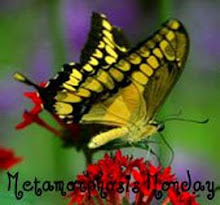It was the first one I've seen this year. She caught my eye fluttering past the window in my front garden. I went out and quietly sat on the front porch.
I have several milk weed plants out there by the gate.
Last year I had one plant and this year 4 or 5, so I'm happy that they do multiply pretty easily.
That one plant, the milkweed, is the only thing that the Monarch caterpillar eats.
The ONLY thing.
SAVE MONARCHS FROM DOW'S CHEMICAL ASSAULT!
Industrial agricultural giant Dow Chemical unveiled its newest toxic herbicide, Enlist Duo, which would destroy milkweed plants that monarch butterflies need to survive. And monarch populations are crashing from nearly 1 billion butterflies 20 years ago to just 57 million last winter. Tell Dow's CEO to shelve the company's plan for selling this potent chemical cocktail — before it wreaks more destruction on monarchs.
Wouldn't it be tragic if we were the last generation to even get a glimpse of this beautiful creatures.
The Monarch yesterday was going from leaf to leaf scoping out my plants. I'm hoping she will lay her eggs there.
Monarch butterflies go through four stages during one life cycle, and through four generations in one year. It’s a little confusing but keep reading and you will understand. The four stages of the monarch butterfly life cycle are the egg, the larvae (caterpillar), the pupa (chrysalis), and the adult butterfly. The four generations are actually four different butterflies going through these four stages during one year until it is time to start over again with stage one and generation one. - See more at: http://www.monarch-butterfly.com/#sthash.b2aDnG0T.dpuf
Stop using herbicides and pesticides!
There are nature things you can do in your gardens that won't kill off everything!!
This is from an article on eHow:
Advantages of Natural Products
- Organic herbicides and pesticides have no toxic or poisonous chemicals that can harm wildlife, sources of water or humans. They also decompose quickly, leaving no residue on plants or in the soil. You might also save money when you choose natural alternatives.
Natural Herbicides
- A mixture of white vinegar and essential oil of orange can be an effective remedy against certain weeds. Select 10 percent acidity white vinegar made from grain alcohol. Combine 1 gallon of vinegar with 1 oz. orange oil, pour into a spray bottle and apply to weeds on a warm, sunny day. Repeat the application every few days until weeds wilt and die.
Natural Pesticides
- Many natural pesticides exist at local gardening centers. For aphids and other soft-bodied insects, use insecticidal soap. For snails and slugs, purchase iron phosphate granules. For caterpillars and other worms that eat plant foliage, purchase bacillus thuringiensis.
Last year I don't think I say any Monarchs!
I remember when I was young, you saw them in your gardens all summer.
Think before you spray!!
Shirley





















No comments:
Post a Comment